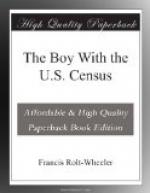“Did you-all read it?” he asked.
“Yes,” said Hamilton.
“Did you-all see that he said ’Very Good’?”
“‘Very Good’ was what was written,” agreed Hamilton, thinking of the wavering and smudged pothooks.
“I c’n do better now,” the boy said quietly, “an’ I’ve been tryin’ jes’ as hard as though Teacheh was in yonder schoolhouse. But thar’s no one to write ‘Very Good’ on ’em any mo’, an’ I reckon thar an’t goin’ to be. But I’m trustin’ that you’ll fin’ him an’ you’ll tell him that he an’t fo’gotten.”
Without a word of farewell, the boy struck into the woods and was lost to sight. The two lads started on their way, but they had not ridden a hundred yards when they heard a hail; looking back, they saw the mountain boy standing on a point of the ridge; and echoing down to them came the lonely cry:
“Fin’ him, an’ tell him he an’t fo’gotten.”
CHAPTER III
A MANUFACTORY OF RIFLES
Settling himself comfortably in the train for his long journey to the capital, one of the first things that Hamilton did was to take from his pocket the little carving that had been given him by the mountain lad and put it away carefully in his grip. Examining it closely as he did so, the boy was astonished to note the fineness of the work, and he realized that it must have taken Bill Wilsh all the spare moments of a long winter to finish it. The work was all the more surprising, Hamilton thought, since it had been done just with a single tool, a common pocketknife, and was yet as fine and delicate as though carved with a set of costly tools. He made up his mind to buy a set and send them to Bill Wilsh with the first pay that he got from his Census Bureau work.
Seated across the aisle from him was another lad about his own age, with whom Hamilton rather wanted to make acquaintance, but the opportunity did not arrive until the first meal, when, by chance, they found themselves on opposite sides of one of the small tables in the dining car. The usual courtesies of the table led to conversation, in the course of which Hamilton’s companion dropped the word “census” in a manner which showed his familiarity with the progress of the work of preparation.
“Are you interested in the census?” asked Hamilton promptly.
“Rather,” the other replied. “I’m going to work in the Bureau. As a matter of fact, I’m just going to Washington to get my appointment now.”
“You are!” exclaimed Hamilton. “Why, that’s exactly what I’m doing. It’s queer we should meet this way.”
“Are you going as an assistant special agent, too?” his new friend asked.
“I’m going to start in that way,” the boy replied
“How do you mean ’start’?” the other queried. “I understand that work on the manufactures will last three or four months, and by that time all the other census-taking will be over.”




